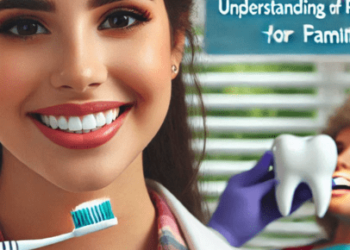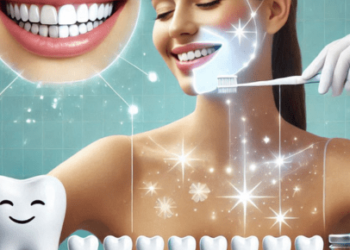
Importance of Dental Health
Maintaining healthy and strong teeth is essential for overall well-being. Here are essential tips to help you achieve optimal oral health and keep your smile bright.
Brush Twice Daily: Proper Oral Hygiene
Brush your teeth twice a day using fluoride toothpaste and a soft-bristled toothbrush to remove plaque, bacteria, and food particles, preventing cavities and gum disease.
Floss Regularly: Clean Between Teeth
Floss between your teeth daily to remove plaque and debris that brushing alone can’t reach, reducing the risk of cavities, gum disease, and bad breath.
Use Mouthwash: Rinse Away Bacteria
Use an antimicrobial mouthwash to rinse your mouth after brushing and flossing, killing bacteria, freshening breath, and promoting gum health.
Watch Your Diet: Limit Sugary Foods
Limit sugary and acidic foods and beverages that can erode tooth enamel and promote tooth decay, opting for healthy snacks like fruits, vegetables, and dairy products instead.
Drink Water: Stay Hydrated
Drink plenty of water throughout the day to wash away food particles, neutralize acids, and stimulate saliva production, which helps protect teeth against decay.
Chew Sugar-Free Gum: Stimulate Saliva
Chew sugar-free gum after meals to stimulate saliva flow, which helps wash away food debris, neutralize acids, and remineralize tooth enamel.
Eat Calcium-Rich Foods: Strengthen Teeth
Include calcium-rich foods such as dairy products, leafy greens, and almonds in your diet to strengthen tooth enamel and support overall dental health.
Avoid Tobacco: Protect Oral Health
Avoid smoking and chewing tobacco, as they can stain teeth, increase the risk of gum disease, and contribute to oral cancer and other health problems.
Protect Your Teeth: Wear a Mouthguard
Wear a mouthguard during sports and recreational activities to protect your teeth from injury, reducing the risk of fractures, chips, and tooth loss.
Visit Your Dentist: Regular Check-Ups
Schedule regular dental check-ups and cleanings every six months to monitor oral health, detect problems early, and receive professional cleanings to remove plaque and tartar.
Address Dental Issues Promptly: Early Intervention
Seek prompt treatment for dental issues such as toothaches, sensitivity, or bleeding gums, as early intervention can prevent further damage and complications.
Practice Proper Brushing Technique: Gentle and Thorough
Brush gently using small circular motions, angling the brush towards the gum line, and spending at least two minutes to thoroughly clean all tooth surfaces.
Replace Your Toothbrush: Every Three Months
Replace your toothbrush or brush head every three months or sooner if bristles become frayed, to ensure effective cleaning and prevent bacterial buildup.
Limit Acidic Drinks: Protect Tooth Enamel
Limit consumption of acidic drinks such as sodas, citrus juices, and sports drinks, as they can weaken tooth enamel and increase the risk of erosion and cavities.
Use a Tongue Scraper: Remove Bacteria
Use a tongue scraper to gently clean the surface of your tongue, removing bacteria, food debris, and dead cells that can contribute to bad breath and oral bacteria.
Avoid Chewing Ice and Hard Objects: Prevent Tooth Damage
Avoid chewing on ice, hard candies, or objects such as pens or pencils, as they can chip or crack teeth and damage dental restorations.
Practice Good Habits: Break Bad Habits
Avoid nail biting, teeth grinding, and using your teeth as tools, as these habits can wear down tooth enamel and lead to dental problems over time.
Be Mindful of Teeth Sensitivity: Choose Sensitivity Toothpaste
If you experience tooth sensitivity, use a desensitizing toothpaste containing fluoride and potassium nitrate to relieve discomfort and protect exposed tooth surfaces.
Manage Stress: Reduce Teeth Grinding
Manage stress through relaxation techniques such as deep breathing, meditation, or yoga, to reduce teeth grinding and jaw clenching that can cause dental problems.
Stay Informed: Educate Yourself
Stay informed about proper dental care practices, new treatments, and preventive measures by consulting reliable sources and discussing with your dentist.
Educate Your Children: Start Early
Teach children good oral hygiene habits from a young age, including proper brushing and flossing techniques, and schedule regular dental visits to instill lifelong dental health habits.
Consider Dental Sealants: Protect Against Cavities
Consider dental sealants for children and adults to protect molars from cavities by sealing off deep grooves and pits where bacteria can accumulate.
Stay Consistent: Commit to Oral Care
Consider dental sealants for children and adults to protect molars from cavities by sealing off deep grooves and pits where bacteria can accumulate.










